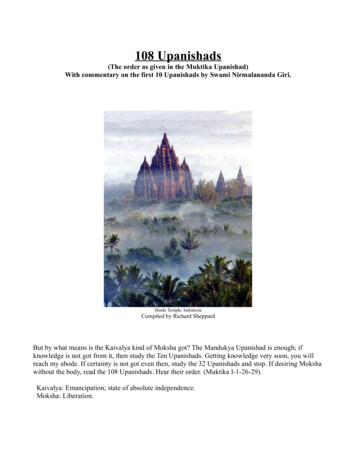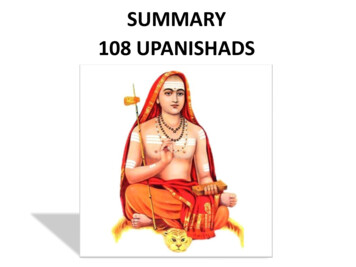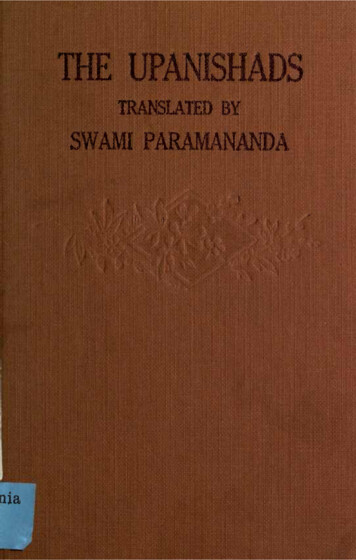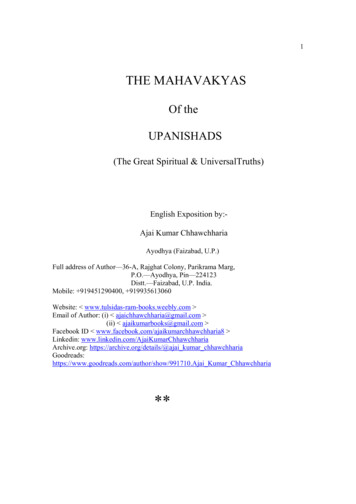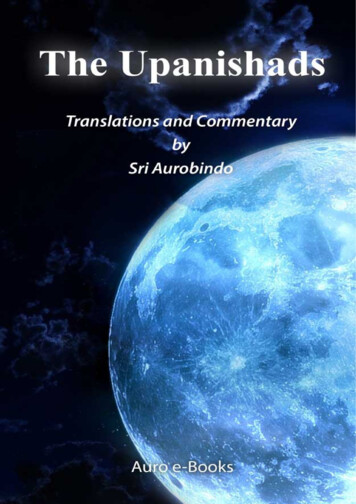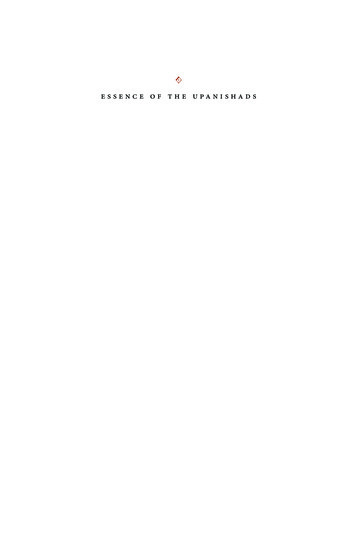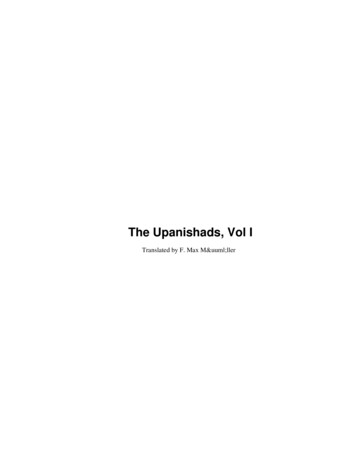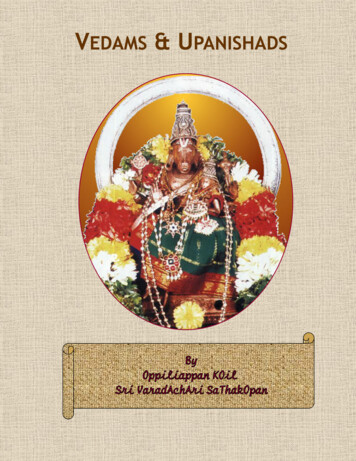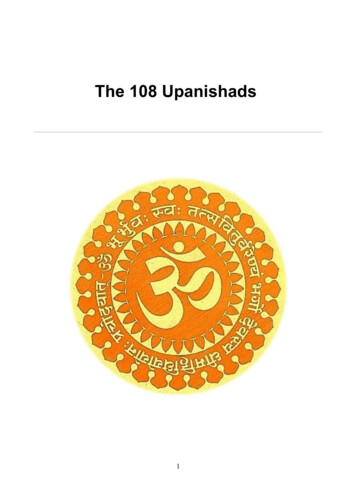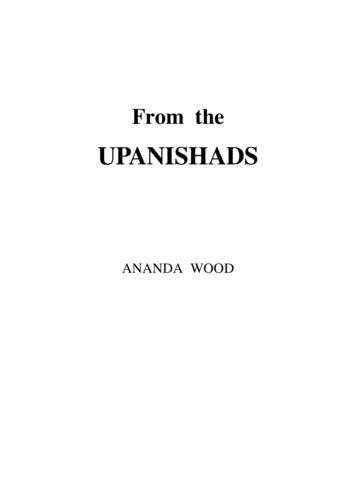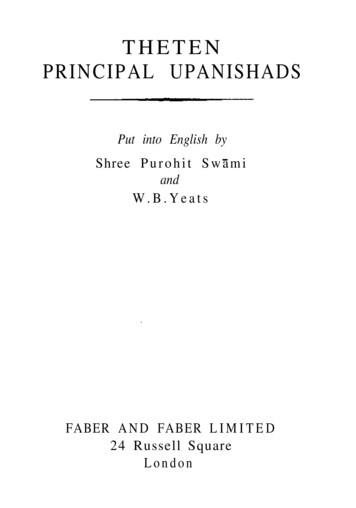
Transcription
THETENPRINCIPAL UPANISHADSPut into English byShree P u r o h i t S w a m iandW.B.YeatsFABER A N D FABER L I M I T E D24 Russell SquareLondon
First published in April Mcmxxxviiby Faber and Faber Limited24 Russell Square London W.C. 1Second edition March McmxxxviiiReprinted McmliiPrinted in Great Britain byBradford and Dickens London W.C. 16 All rights reserved
PrefaceI n c o m p e t e n t to expound I n d i a n philosophy, I shallillustrate some few t h i n g s t h a t have to be said f r o mm y o w n daily thoughts and contemporary poetry.Shree P u r o h i t S w a m i has asked me to introducew h a t is twice as m u c h his as m i n e , for he knows Sans k r i t and E n g l i s h , I b u t E n g l i s h . Before, after and d u r i n g his n i n e years' p i l g r i m a g e r o u n d I n d i a he has sungi n Sanskrit every m o r n i n g t h e Awadhoota Geeta, att r i b u t e d to Dattatreya, an ancient Sage to w h o m hepays particular devotion, and t w o Upanishads, t h e Sadg u r u , his o w n composition, and t h e M a n d o o k y a ; andperhaps at n i g h t to e n t e r t a i n or edify his hosts, songs ofhis o w n composition ; those i n M a r a t h i o r H i n d i a m o n gthe unlearned, those in Sanskrit a m o n g the learned.Sanskrit has been a f a m i l i a r speech, not c h a n g i n g f r o mplace to place, b u t always on his tongue.For some f o r t y years my f r i e n d George Russell ( A . E . )has quoted me passages f r o m some Upanishad, and forthose f o r t y years I have said to myself—some day I w i l lf i n d out i f h e knows w h a t h e i s t a l k i n g about. Betweenus existed f r o m t h e b e g i n n i n g t h e antagonism t h a tunites dear friends. M o r e t h a n once I asked h i m t h ename of some translator a n d even b o u g h t t h e book, b u tt h e most e m i n e n t scholars l e f t me incredulous. C o u l d7
latinised words, hyphenated words ; could polyglotphrases, sedentary distortions of unnatural English:—'However many Gods in Thee, All-Knower, adverselyslay desires of a person'—could muddles, muddiedby 'Lo! Verily' and 'Forsooth', represent what grassfarmers sang thousands of years ago, what their descendants sing today? So when I met Shree PurohitSwami I proposed that we should go to India andmake a translation that would read as though theoriginal had been written in common English: 'Towrite well,' said Aristotle, 'express yourself like thecommon people, but think like a wise man', a favourite quotation of Lady Gregory's—I quote her diaryfrom memory. Then when lack of health and moneymade India impossible we chose Majorca to escape telephones and foul weather, and there the work was done,not, as I had planned, in ease and leisure, but in the i n terstices left me by a long illness. Yet I am satisfied; Ihave escaped that polyglot, hyphenated, latinised,muddied muddle of distortion that froze belief. Can webelieve or disbelieve u n t i l we have put our thoughtinto a language wherein we are accustomed to expresslove and hate and all the shades between? When beliefcomes we stand up, walk up and down, laugh or swingan arm; a mathematician gets drunk ; finding thatwhich is the prerogative of men of action.I have not worked to confound George Russell,though often saddened by the thought that I could not—he died some months ago—but to confound some8
thing in myself. He expressed in his ceaseless vaguepreoccupation w i t h the East a need and curiosity of ourtime,' Psychical research, which must some day deeplyconcern religious philosophy, for its evidences surroundthe pilgrim and the devotee though they never takethe centre of the stage, has already proved the existence of faculties that would, combined into one man,make of that man a miracle-working Yogi. Moreand more too does it seem to approach a main thoughtof the Upanishads. Continental investigators, who rejectthe spiritism of Lodge and Crookes, but accept theirphenomena, postulate an individual self possessed ofsuch power and knowledge that they seem at everymoment about to identify it w i t h that Self withoutlimitation and sorrow, containing and contained by all,and to seek there not only the l i v i n g but the dead.But our need and curiosity have no one source. Between 1922 and 1925 English literature, wherever mostintense, cast off its preoccupation w i t h social problemsand began to create myths like those of antiquity, andto ask the most profound questions. I recall poems byT. S. Eliot, Those Barren Leaves' by Aldous Huxley,where there is a Buddhistic hatred of life, or a hatredSchopenhauer did not so much find in as deducedfrom a L a t i n translation of a Persian translation ofthe Upanishads: certain poems—The Seven Days ofthe Sun', 'Matrix', T h e Mutations of the Phoenix',by W. J. Turner, by Dorothy Wellesley, by HerbertRead, which have displayed in myths, not as might9
some writer of my youth for the sake of romantic suggestion but urged by the most recent thought, the worldemerging from the human mind. A still younger generation has brought a more minute psychological curiosity, suggesting an eye where a goldsmith's magnifying glass is screwed, to like preoccupations.In their pursuit of meaning, Day Lewis, MacNeice,Auden, Laura Riding have thrown off too much, as Ithink, the old metaphors, the sensuous tradition of thepoets:' H i g h on some mountain shelfHuddle the pitiless abstractions bald about the neck;'but have found, perhaps the more easily for that sacrifice, a neighbourhood where some new Upanishad,some half-asiatic masterpiece, may start up amid ouraverted eyes.W h e n I was young we talked much of tradition, andthose emotional young men, Francis Thompson, LionelJohnson, John Gray, found it in Christianity. But nowthat The Golden Bough has made Christianity lookmodern and fragmentary we study Confucius w i t hEzra Pound, or like T. S. Eliot find in Christianity aconvenient symbolism for some older or newer thought,or say w i t h Henry Airbubble, 'I am a member of theChurch of England but not a Christian.' Shree PurohitSwami and I offer to some young man seeking, likeShakespeare, Dante, M i l t o n , vast sentiments and generalisations, the oldest philosophical compositions of theworld, compositions, not writings, for they were sung10
long before they were written down. European scholarship w i t h many doubts has fixed their date, or the dateof the most important, as a little before 600 B.c. whenBuddha was born, but Indian scholarship prefers a farearlier date. Whatever the date, those forest Sages began everything; no fundamental problem of philosophy,nothing that has disturbed the schools to controversy,escaped their notice.It pleases me to fancy that when we t u r n towards theEast, in or out of church, we are turning not less to theancient west and north; the one fragment of paganIrish philosophy come down, 'the Song of Amergin',seems Asiatic; that a system of thought like that ofthese books, though perhaps less perfectly organised,once overspread the world, as ours today; 1 that ourgenuflections discover in that East something ancestralin ourselves, something we must bring into the lightbefore we can appease a religious instinct that for thefirst time in our civilisation demands the satisfaction ofthe whole man.Upanishad is doctrine or wisdom (literally 'At the feetof', meaning thereby ' A t the feet of some Master'), thedoctrine or wisdom of the Wedas. Each is attached tosome section and sometimes is named from the section.The Katha-Upanishad for instance is part of the Kathak1All Indian clerks in Government offices have just been ordered to wear trousers, so at any rate declares a London merchant, an exporter to India, who has decided to specialise introuser-stretchers. It follows the flag.11
Brahman section in the Yajur-Weda. Shree PurohitSwami has omitted the usual first five chapters of theChhand6gya-Upanishad because they are so intermixedw i t h ritual that they are no longer studied, though stillsung. For the same reason he has selected from Brihadaranyaka-Upanishad such passages as contain no suchintermixture. A few passages have been 'omitted, notbecause descriptions of ritual but because repetitionsof what is said and said as well elsewhere. Their orderwherein the Upanishads should be studied, according totradition, is that in which they are printed in this book.W.12B.YEATS.
ContentsI . T h e Lord15(Eesha-Upanishad)I I . At Whose Command?19(Kena-Upanishad)I I I . F r o m the Kathak Branch of theWedas 25(Katha-Upanishad)I V . Questions39(Prashna-Upanishad)V . At the Feet of the M o n k49(Mundaka-Upanishad)V I . At the Feet of Master Mandooka59(Mandookya-Upanishad)V I I . F r o m the Taittireeya Branch of theWedas 79VIII.(Aitareya-Upanishad)85I X . T h e Doctrine of the Chhandogyas(Chhandogya-Upanishad)119X . Famous Debates in the Forest(Brihadaranyaka-Upanishad)13
IThe Lord(Eesha-Upanishad)That is perfect. This is perfect. Perfect comes fromperfect. Take perfect from perfect, the remainder isperfect.M a y peace and peace and peace be everywhere.Whatever lives is f u l l of the Lord. Claim nothing;enjoy, do not covet His property.T h e n hope for a hundred years of life doing yourduty. No other way can prevent deeds from clinging,proud as you are of your human life.They that deny the Self, return after death to a godless b i r t h , blind, enveloped in darkness.The Self is one. Unmoving, it moves faster than themind. The senses lag, but Self runs ahead. Unmoving,it outruns pursuit. Out of Self comes the breath that isthe life of all things.Unmoving, it moves; is far away, yet near; w i t h i nall, outside all.Of a certainty the man who can see all creatures inhimself, himself in all creatures, knows no sorrow.15
How can a wise man, knowing the unity of life, seeing all creatures in himself, be deluded or sorrowful?The Self is everywhere, without a body, without ashape, whole, pure, wise, all knowing, far shining, selfdepending, all transcending} in the eternal processionassigning to every period its proper duty.Pin your faith to natural knowledge, stumblethrough the darkness of the blind; pin your faith tosupernatural knowledge, stumble through a darknessdeeper still.Natural knowledge brings one result, supernaturalknowledge another. We have heard it from the wisewho have clearly explained it.They that know and can distinguish between naturalknowledge and supernatural knowledge shall, by thefirst, cross the perishable in safety; shall, passing beyondthe second, attain immortal life.Pin your faith to the seed of nature, stumble throughthe darkness of the blind; pin your faith to the shapes ofnature, stumble through a darkness deeper still.The seed of nature brings one result; the shapes ofnature another. We have heard it from the wise, whohave clearly explained i t .They that know and can distinguish between theshapes of nature and the seed of nature shall, by the first,cross the perishable in safety; shall, passing beyond thesecond, attain immortal life.They have put a golden stopper into the neck of16
the bottle. Pull it, Lord! Let out reality. I am full oflonging.Protector, Seer, controller of all, fountain of life, upholder, do not waste light; gather light; let me see thatblessed body—'-Lord of all. I myself am He.Life merge into the all prevalent, the eternal; bodyturn to ashes. Mind! meditate on the eternal Spirit; remember past deeds. Mind! remember past deeds; remember, Mind! remember.Holy light! illuminate the way that we may gatherthe good we planted. Are not our deeds known to you?Do not let us grow crooked, we that kneel and prayagain and again.17
nAt Whose Command ?(Kena-Upanishad)1Speech, eyes, ears, limbs, life, energy, come to myhelp. These books have Spirit for theme. I shall neverdeny Spirit, nor Spirit deny me. L e t me be in union,communion w i t h Spirit. W h e n I am one w i t h Spirit,may the laws these books proclaim live in me, may thelaws live.T h e enquirer asked: ' W h a t has called my m i n d tothe hunt? W h a t has made my life begin? W h a t wags inmy tongue? W h a t God has opened eye and ear?'T h e teacher answered: ' I t lives in all that lives,hearing through the ear, thinking through the m i n d ,speaking through the tongue, seeing through the eye.T h e wise m a n clings neither to this nor that, rises outof sense, attains i m m o r t a l life.'Eye, tongue, cannot approach it nor m i n d know;not knowing, we cannot satisfy enquiry. It lies beyondthe known, beyond the unknown. We know throughthose who have preached it, have learnt it from tradition.19
T h a t which makes the tongue speak, but needs notongue to explain, that alone is Spirit; not what sets theworld by the ears.'That which makes the mind think, but needs nomind to think, that alone is Spirit; not what sets theworld by the ears.'That which makes the eye see, but needs no eye tosee, that alone is Spirit; not what sets the world by theears.'That which makes the ear hear, but needs no ear tohear, that alone is Spirit; not what sets the world bythe ears.'That which makes life live, but; needs no life to live,that alone is Spirit; not what sets the world by the ears.'2' I f you think that you know much, you know little.If you think that you know It from study of your ownmind or of nature, study again.'The enquirer said: 'I do not think that I know much,I neither say that I know, nor say that I do not.'The teacher answered: 'The man who claims that heknows, knows nothing; but he who claims nothing,knows.'Who says that Spirit is not known, knows; who claimsthat he knows, knows nothing. The ignorant think thatSpirit lies within knowledge, the wise man knows Itbeyond knowledge.'Spirit is known through revelation. It leads to free20
dom. It leads to power. Revelation is the conquest ofdeath.'The living' man who finds Spirit, finds Truth. But ifhe fail, he sinks among fouler shapes. The man wh
the Upanishads: certain poems—The Seven Days of the Sun', 'Matrix', The Mutations of the Phoenix', by W. J. Turner, by Dorothy Wellesley, by Herbert Read, which have displayed in myths, not as might 9 . some writer of my youth for the sake of romantic sug gestion but urged by the most recent thought, the world emerging from the human mind. A still younger gener ation has brought a more .

